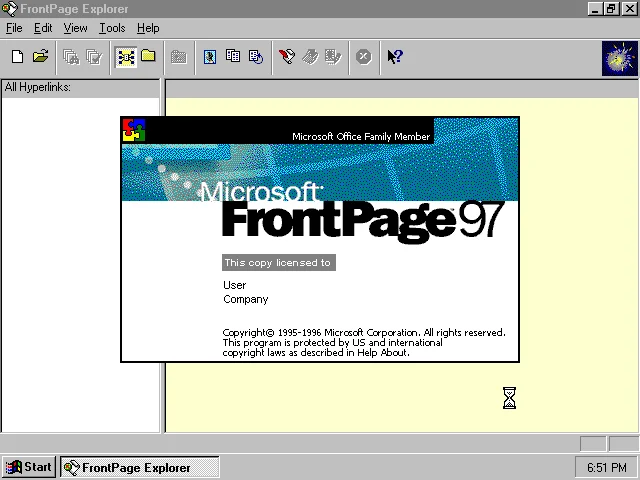
Vibe Coding Is the New FrontPage - And That's Not Necessarily Bad
Table of Contents
Intro
Remember Microsoft FrontPage? If you’re old enough to have been around during the late 90s web development scene, you probably have strong feelings about it. FrontPage was the tool that “democratized” web development - suddenly, anyone could create websites without knowing HTML, CSS, or understanding how the web actually worked.
The web development community absolutely hated it.
The FrontPage Era
Back then, “real” developers scoffed at FrontPage for all the right reasons:
- It generated messy, non-standard HTML
- It created websites that only worked properly in Internet Explorer
- It used table-based layouts for everything
- It encouraged inline styles and deprecated HTML practices
- Worst of all, it meant anyone could suddenly call themselves a web developer
The purists weren’t wrong about the technical issues. FrontPage did create a lot of terrible websites. But they missed the bigger picture.
Enter Vibe Coding
Today, we’re seeing the exact same pattern with AI-assisted coding tools. I call this phenomenon “Vibe Coding” - the ability to build applications based on vibes and natural language descriptions rather than deep technical knowledge.
Tools like GitHub Copilot, Claude, ChatGPT, and others are enabling people to:
- Generate entire functions from comments
- Build applications from high-level descriptions
- Fix bugs by describing the problem in plain English
- Create complex systems without understanding every implementation detail
And just like with FrontPage, there’s significant resistance from the established development community.
History Repeating Itself
The complaints sound familiar:
- “People won’t learn the fundamentals”
- “The code quality will be terrible”
- “Anyone can call themselves a developer now”
- “It’s going to flood the market with bad programmers”
But here’s what the FrontPage critics missed back then, and what the Vibe Coding critics are missing now: these tools aren’t the end destination - they’re the entry point.
The Real Impact of FrontPage
Yes, FrontPage created a lot of bad websites. But it also:
- Got thousands of people interested in web development who otherwise never would have started
- Provided a stepping stone for many developers who later became skilled professionals
- Forced the web standards community to create better tools and practices
- Democratized content creation on the web
Many developers I know today started with tools like FrontPage, Dreamweaver, or other WYSIWYG editors. They didn’t stay there - they used these tools to understand concepts faster and then progressed to more sophisticated approaches.
Why Vibe Coding is Different (and Better)
There’s a crucial difference between FrontPage and today’s AI coding tools. FrontPage taught you bad practices - table layouts, inline styles, and browser-specific code.
Modern AI tools actually teach you good practices:
- They generate code following current best practices
- They explain what the code does and why
- They suggest improvements and optimizations
- They help you understand patterns and architectures
- They’re constantly updated with the latest standards and frameworks
The Real Challenge
The problem was never FrontPage itself - it was when people stopped learning and relied entirely on the tool without understanding the fundamentals. The same risk exists with Vibe Coding.
Some developers will use AI as a crutch and never progress beyond copy-paste development. But others will use it as an accelerator to:
- Understand complex concepts faster
- Experiment with new technologies without the initial learning curve
- Focus on architecture and business logic instead of syntax
- Build more ambitious projects than they could tackle alone
Embracing the Change
As someone who’s been in tech for years, I’ve learned that fighting these democratization waves is pointless. Every major shift in technology faces the same resistance:
- Assembly programmers complained about high-level languages
- C programmers complained about garbage-collected languages
- Desktop developers complained about web frameworks
- Backend developers complained about full-stack frameworks
The pattern is always the same: the tools get better, the barrier to entry gets lower, and the overall ecosystem improves.
Moving Forward
The question isn’t whether Vibe Coding is good or bad - it’s how we adapt to it and use it effectively. Here’s what I think we should focus on:
For experienced developers: Use AI to handle boilerplate and focus on architecture, design patterns, and complex problem-solving. Mentor newcomers who are starting with AI tools.
For newcomers: Use AI as a learning accelerator, but don’t skip the fundamentals. Understand what the generated code does and why it works.
For the industry: Create better educational resources that combine AI assistance with fundamental knowledge. Build tools that encourage learning alongside code generation.
Conclusion
Just like FrontPage didn’t kill web development (it actually expanded it massively), Vibe Coding won’t kill programming. It will change what it means to be a programmer, lower the barrier to entry, and probably result in a lot more software being built.
Some of that software will be terrible. Some of it will be amazing. Most of it will be somewhere in between - just like always.
The developers who adapt and learn to work effectively with these tools will thrive. Those who resist and insist on doing everything the “old way” will find themselves increasingly irrelevant.
History doesn’t repeat, but it sure does rhyme.